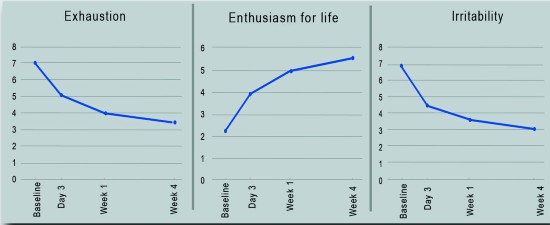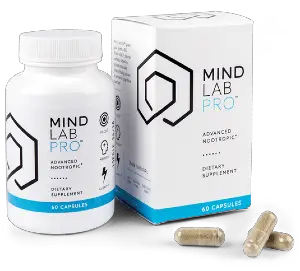Rhodiola Rosea is an adaptogenic herb that brings your body and mind into a state of balance.
More precisely, Rhodiola will boost your resilience to stress, increase energy & mental clarity, and protect brain cells from damage. You may also find Rhodiola helpful for anxiety.
Rhodiola rosea – Let’s Get Started
Rhodiola Rosea has been extensively studied since the 1960s. The bulk of the research shows some truly impressive benefits of this herb.
Mainly, Rhodiola appears to enhance the body’s physical endurance, promote energy, combat depression, and even potentially increase longevity. (1, 2, 3)
Rhodiola Rosea is effective at:
- Improving Mood – Rhodiola promotes mental well being by increasing serotonin production in your brain.
- Reducing Fatigue and Stress – Rhodiola is particularly effective at boosting energy levels and mental performance when you’re under chronic stress. It helps boost ATP, which is your energy source.
- Regenerating Nerves – Rhodiola Rosea is one of the most powerful herbs for neurogenesis; it repairs and helps your brain make new neurons. Rhodiola also reduces the inflammatory proteins, along with protecting neurons from oxidative stress.
This ancient herb has been well-known in the nootropic community for its anti-stress and anxiety-relieving properties. Some even argue it stands shoulder to shoulder with some anxiolytic cures – below we’ll check the evidence that supports this notion.
Read on to learn more…
Rhodiola Rosea as a Nootropic – The Overview
Rhodiola Rosea or also known as Roseroot, Arctic Root, and Golden Root. Traditional health has used it for thousands of years. In the past, Rhodiola was given to workers to make them more productive.
People from Russia and Scandinavia have been using this adaptogenic herb for fatigue, poor memory, and lack of concentration. As it turns out, Rhodiola makes workers more productive.
But I’m just starting with the list of Rhodiola’s benefits.
It’s also shown to have impressive anti-anxiety and anti-depressant effects. So impressive, in fact, that it’s considered to stand shoulder to shoulder to some prescription pharmaceuticals. (4)
Organ studies show that Rhodiola Rosea has adaptogenic qualities that protect your brain, support the cardiovascular system, enhance mood, promote mental performance, and even potentially extend life. (3)

And while Rhodiola Rosea has 140 compounds in its roots and underground stems, the benefits I listed above come from only a few critical components of Rhodiola – including rosin, rosavin, and rosarian. Collectively these are called rosavins.
However, isolating Rhodiola Rosea’s compounds won’t do you much good. As it turns out, certain chemicals have to work together in order for the herb to be effective. These include rosavins but also salidroside and tyrosol.
How Does Rhodiola Support Your Brain?
Two main ways in which Rhodiola supports your brain:
- Enhances Mood – Both anecdotal and clinical data show that Rhodiola Rosea supports mood and mental well being.
- Improves mental clarity and performance under stress – Did you ever feel your brain ‘blank out’ when you were very stressed? When you’re stressed, you can’t think clearly, as your body is in the fight-or-flight state. Luckily, Rhodiola helps you maintain clear thinking under high-pressure situations.
Who is Rhodiola Rosea For?
Is Rhodiola Rosea the right nootropic for you? Should you supplement it?
To find out whether Rhodiola Rosea is for you, you should ask yourself a few questions. First, are you under stress often? Do you find it hard to focus in school or at work? Having lots of brain fog during the day? Perhaps your energy isn’t what you’d want it to be?
Well, if you found yourself in any of these questions, then yes – Rhodiola Rosea is for you. And it could help you with your problem.
The truth is that every day we’re bombarded with stress from all sides – physical stress, emotional stress, chemical stress… all of these can knock your hormones out of balance. When this happens, you start to experience things like mental fatigue and brain fog. (5)
Rhodiola Rosea is particularly effective for combating stress because it belongs to a group of herbs known as adaptogens. These work to bring your endocrine system back to homeostasis – supporting resistance to stress and balanced physiological function.
How Rhodiola Can Help You
Rhodiola excels at providing both a short-term performance boost and long-range brain support. How does it do it? Two main ways (6):
- One dose of Rhodiola will act on your sympathoadrenal-system (SAS), which modulates your body’s emergency ‘flight-or-fight’ response and other short-term stress reactions.
- Continual supplementation of Rhodiola helps to balance the hypothalamic-pituitary-adrenal axis (HPA axis) which is a long-term stress response center in your body.
By offsetting the brain-dulling effects of stress, Rhodiola will sharpen your cognition and increase brain energy when it matters the most.
I’ve mentioned above that Rhodiola has long been used as a productivity booster in Russia. But it’s also heavily utilized by astronauts to stay sharp under pressure and by elite athletes to gain a legal and safe edge over their competition.
Recommended Product That Has Rhodiola: Mind Lab Pro

Developed by experts, featuring 11 bioactive ingredients, designed to naturally boost mood, motivation and cognitive function.
Mechanisms of Action of Rhodiola
- Acts on neurotransmitters dopamine, serotonin, and norepinephrine (noradrenaline)
- Offers neuroprotective properties
- Regulates stress hormones such as cortisol, which negatively affect cognition
- Might support the ‘memory and learning’ brain chemical acetylcholine
Nootropic Benefits
- Enhances mental and physical work capacity
- Might be slightly stimulating, much different than the caffeine ‘rush’ though
- Supports active and energized mental state
- Reduces fatigue and brain fog during stress
- Improves mood
Brain Pathways That Rhodiola Targets
In addition to its performance-boosting benefits, Rhodiola Rosea optimizes a few of your brain’s pathways for all-round brain health support. Reviews and research papers have suggested that Rhodiola:
- Promotes a positive and calm mindset
- Enhances productivity (both mental and physical) without the typical stimulant crash
- Reduces general fatigue caused by stress
So, which brain pathways does Rhodiola target? Let me show you below.
Neurotransmitters
Rhodiola Rosea helps to sustain neurotransmitters serotonin, dopamine, and norepinephrine.
Brain chemicals in this category are vital for focus, mental processing speed, memory, and mood. The way Rhodiola supports these neurotransmitters is through modulating monoamine oxidase (MAO), which is responsible for destroying these brain chemicals. (7)
Rhodiola also appears to inhibit ACHe, an enzyme that breaks down acetylcholine. Thus, it helps to keep this neurotransmitter higher as well – resulting in improved memory and learning capacity. (8)
Brain Cell Protection
Rhodiola Rosea has three brain-protective properties: structure-supportive, antioxidant, and inflammation-regulating effects. As such, it combats the cognitive decline of the aging brian.
It’s thought that these neuroprotective benefits stem from Rhodiola’s ability to regulate the endocrine system and HPA axis, making your body (and mind) more robust and resistant to stress.
Mental Energy
In small amounts, Rhodiola Rosea appears to be able to boost your brain’s electrical activity. (1) This produces a stimulating effect within 30 minutes of ingestion, and may last up to 6 hours.
(9) This stimulating effect isn’t the same as that of caffeine. Whereas caffeine often leaves users feeling jittery and anxious, Rhodiola’s effects are more stable.
Rhodiola Rosea Studies
Study #1 – Rhodiola Fights Fatigue
If there’s one benefit Rhodiola is best known for, it’s anti-fatigue.
A double-blind placebo-controlled study tested this notion on 161 cadets who were 19-21 years old. The initial goal was to test the effect of a single Rhodiola Rosea SHR-5 extract dose on these cadet’s mental capacity when they were stressed and fatigued.
However, another objective was to see if higher doses of Rhodiola would yield bigger benefits. The other dose was 50% higher than the first one. Specifically, the cadets took either 2 or 3 capsules or Rhodiola extract.
The results?
The study showed that Rhodiola enhanced resistance to fatigue in cadets. However, there wasn’t a lot of difference between the lower and higher Rhodiola dosage. In fact, the lower dosage seemed to yield slightly better effects – which is quite surprising! (10)
Key Point: Rhodiola Rosea can improve mental capacity and resistance to fatigue during stressful situations. Lower doses of Rhodiola Extract work just as well, if not even better, than higher doses.
Rhodiola Rosea vs an Antidepressant
This study compared the effects of an SSRI antidepressant Sertraline (aka, Zoloft) vs those of Rhodiola on mood and depression.
The trial included 57 people who were diagnosed with depression. They were split into three groups:
- One group took Rhodiola Rosea extract
- The other group took Sertraline
- The last group took a placebo
The study lasted 12 weeks. The participants were tested in 3 different depression score tests. The results showed that Rhodiola had slightly weaker antidepressant effects than Sertraline, but it was also better tolerated and produced significantly fewer side effects.
The researchers of this study concluded that even though Rhodiola might not be quite as potent as sertraline, it possesses a better “risk to benefit ratio” in those suffering from “mild to moderate depression.” In the words of the study. (4)
Key Point: Rhodiola’s effects on depression could be compared to those of sertraline, an antidepressant pill.
Rhodiola is a little weaker, but it also produces significantly fewer adverse effects. According to the study researchers, this makes it a more favorable option for people with mild to moderate depression.
Rhodiola Rosea Boosts Mental Performance Under Pressure
If you work long hours and are drained from everyday stress, then Rhodiola could be for you.
In this study, 56 healthy young physicians took Rhodiola Rosea. The researchers wanted to see if Rhodiola could relieve some of the stress from these physician’s night shifts. They were tested for associative thinking, calculation, focus, short-term memory, and the level of mental fatigue.
What the tests showed was that Rhodiola improved these young doctor’s cognitive function and resistance to fatigue on their night duty. (11)
Key Point: Rhodiola boosts cognition and resistance to stress and fatigue during long work shifts.
What Does Rhodiola Feel Like?
How soon you’ll feel Rhodiola’s benefits depends on factors like your physical and mental condition, behavior, genetics, and of course, your lifestyle.
Some users report feeling Rhodiola’s effects within a few days. Though it’s worth saying that most of Rhodiola’s benefits do build up over time. So you can expect a progressive increase in benefits as you continue to take this herb.
- Looking at clinical research, the benefits of Rhodiola Rosea seem to peak after 30-40 days of continual use. From there, you keep taking it to maintain the effects.
As for how Rhodiola Rosea feels, many people report that it helps them with anxiety. They feel a lift in mood and overall quality of life. You may also feel an increase in energy from taking Rhodiola.
Your focus, levels of concentration, and cognitive function in general may improve as well.
What I’ve found with Rhodiola is that it makes my dreams very vivid. Some users report the same online. If you’re into lucid dreaming, this effect can be really cool. But it can also be too much for some people – it’s all down to the individual.
How to Get the Most Out of Rhodiola
You can take Rhodiola Rosea in capsules, as a tea, or in powder.
You can also take it alone, or if you’re like me, combine it with other nootropics. This takes its benefits to the next level.
For example, I prefer professional nootropic formulations like Mind Lab Pro. Which, alongside Rhodiola Rosea, contains 10 extensively researched brain-enhancing nootropics.
These ingredients in Mind Lab Pro work in synergy to combat anxiety, improve memory and cognition, stabilize mood, repair brain cells, and promote brain energy.
You can read my full Mind Lab Pro review here.
Rhodiola Rosea Dosage
The optimal Rhodiola Rosea dosage for nootropic purposes is 150-200mg per day.
Make sure to choose an extract of Rhodiola which contains a 3:1 ratio of rosavins and salidrosides. This is how these compounds occur in nature.
Taking more than 1,000mg of Rhodiola per day doesn’t seem to offer any additional benefits.
Rhodiola Rosea Side Effects
Since it’s a natural adaptogen that’s been used for thousands of years, Rhodiola is considered safe and no-toxic. You’ll find very few reports of its side effects.
If you take much higher than recommended dosages, then it is possible to experience an upset stomach, headaches, dry mouth, insomnia, and nausea.
Another important factor to count in is that Rhodiola inhibits monoamine oxidase. This results in your brain having higher dopamine and serotonin levels.
This is only a problem if you’re on medication, such as an antidepressant that acts as an MAO inhibitor. Combining it with Rhodiola has the potential to lead to serious side effects.
Being on the safe side, it’s best to have a chat with your doctor before taking Rhodiola if you’re on any meds.
Anything Else to Consider?
To make sure you get pure and natural Rhodiola Rosea, you need to look for an extract or powder that’s standardized to have 3% rosavins and 1% salidroside. The 3:1 ratio is important here because that’s how it naturally occurs in Rhodiola’s root.
Now, this is the main reason why many people don’t experience benefits from taking Rhodiola. Due to the huge demand, Rhodiola has been over-harvested in recent years.
Higher quality Rhodiola Rosea is harder and more expensive to come by nowadays. But the cost is well worth the benefits in my opinion.
This is why I take Rhodiola as a part of proven pre-formulated nootropic stacks. I keep coming back to Mind Lab Pro which is what works best for me.
With 11 science-backed and extremely high-quality ingredients – including a naturally harvested, premium source of Rhodiola with 3:1 rosavins to salidrosides – MLP is hands down the best professional natural nootropic formula I’ve taken.
Rhodiola rosea FAQ
Can Rhodiola Get You High?
No, Rhodiola doesn’t get you high.
You could say that Rhodiola stimulates you, because it enhances the brain’s electrical activity. But it doesn’t have the same effects as, say, cannabis, which contains THC that is responsible for its high.
Will Rhodiola Break a Fast?
Rhodiola won’t break your fast. It’s the opposite – Rhodiola improves your metabolism and fast-state mental performance. It spikes brainpower for up to 6 hours while helping to promote insulin sensitivity.
This makes it ideal for ‘fitness nuts’ who love to train on an empty stomach.
Stacking Rhodiola and Ashwagandha – Should You Try it?
Rhodiola and Ashwagandha stack is a good idea for anyone suffering from stress and mental fatigue.
As both herbs work to reduce cortisol and other stress hormones (although, both in their own unique ways), you can expect to gain a wider spectrum of benefits by stacking them together.

Rhodiola rosea Conclusion
Your body can’t produce Rhodiola on its own (duh!). So you need to take it as a supplement to get its benefits.
If you’re suffering from stress, mental fatigue, and anxiety. Then Rhodiola can be the perfect answer to your problems. It’s shown to be extremely potent for helping with mental energy, clarity, and mood. It also makes people more productive.
On a deeper level, Rhodiola works to repair nerves and protect them from oxidative stress. It also works as an adaptogen, bringing your endocrine system into balance. In other words, Rhodiola stimulates you when you feel down, and it calms you down when you’re too anxious.
Rhodiola’s stimulating effects come in part thanks to its positive effects on your mitochondria – small energy factories within your cells.
Most of Rhodiola’s benefits come from small dosages, 150-200mg per day. Higher doses don’t appear to offer any additional benefits. In some cases, they could actually be less effective than lower doses.
Rhodiola rosea Final Words
With Rhodiola, the only thing you need to keep in mind is to look for a high-quality extract that’s standardized to have a 3:1 ratio of rosavins to salidrosides.
This ensures maximum potency, safety, and effectiveness of this mighty adaptogenic herb.
Recommended Product: Mind Lab Pro

Developed by experts, featuring 11 bioactive ingredients, designed to naturally boost mood, motivation and cognitive function.
Rhodiola Rosea References
- Rhodiola rosea: A Phytomedicinal Overview. (source)
- Plant adaptogens III.* Earlier and more recent aspects and concepts on their mode of action. (source)
- Rosenroot (Rhodiola rosea): traditional use, chemical composition, pharmacology and clinical efficacy. (source)
- Rhodiola rosea versus sertraline for major depressive disorder: A randomized placebo-controlled trial. (source)
- Stress and obesity: the role of the hypothalamic–pituitary–adrenal axis in metabolic disease. (source)
- Effects of Adaptogens on the Central Nervous System and the Molecular Mechanisms Associated with Their Stress—Protective Activity. (source)
- Monoamine oxidase inhibition by Rhodiola rosea L. roots. (source)
- Acetylcholine Esterase Inhibitors in Rhodiola rosea. (source)
- Stimulating effect of adaptogens: an overview with particular reference to their efficacy following single dose administration. (source)
- A randomized trial of two different doses of an SHR-5 Rhodiola rosea extract versus placebo and control of capacity for mental work. (source)
- Rhodiola rosea in stress induced fatigue–a double blind cross-over study of a standardized extract SHR-5 with a repeated low-dose regimen on the mental performance of healthy physicians during night duty. (source)




